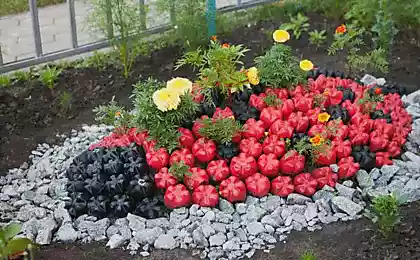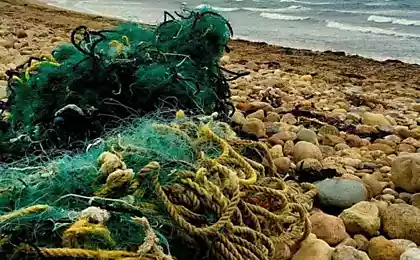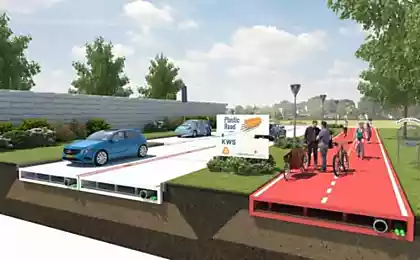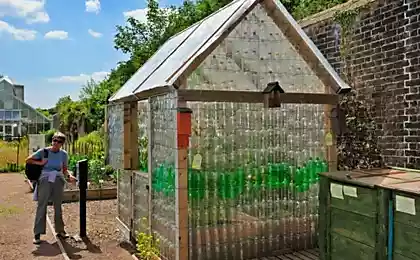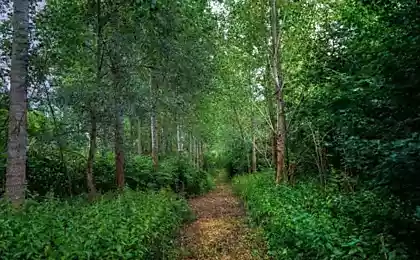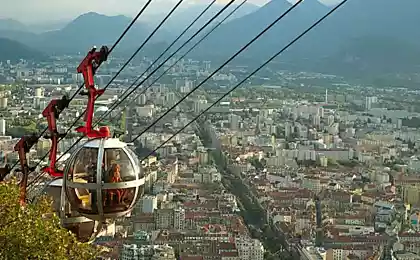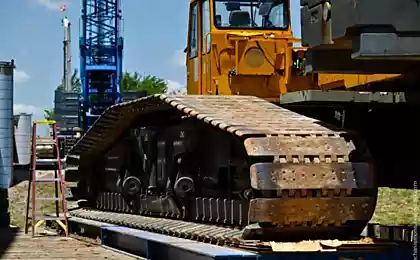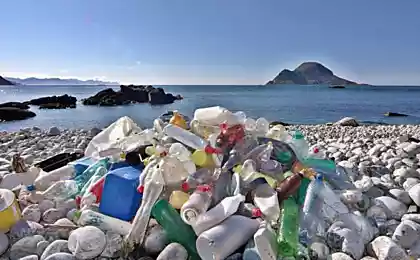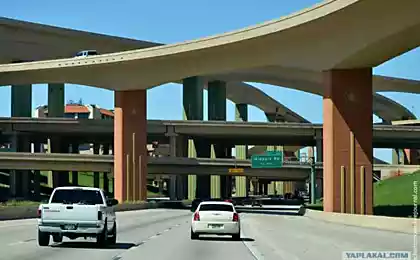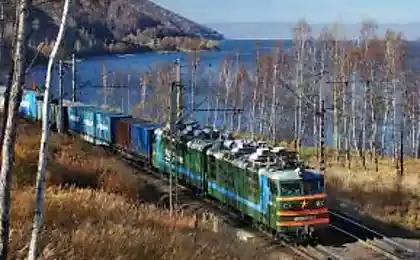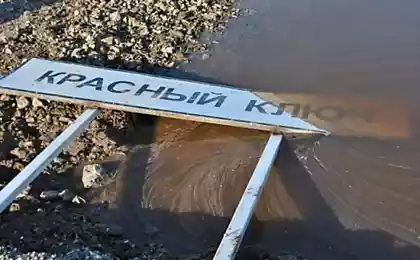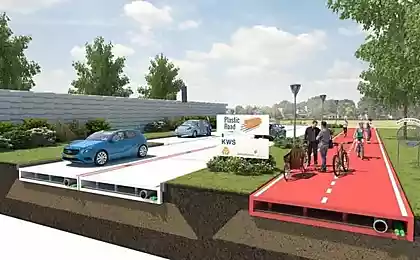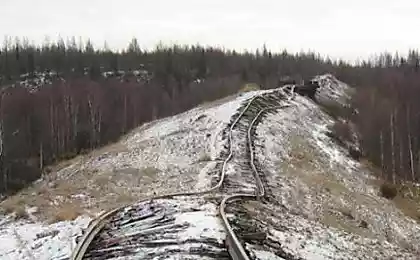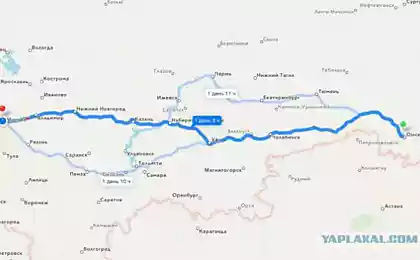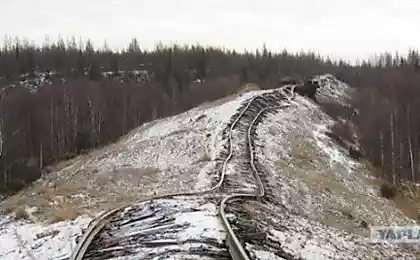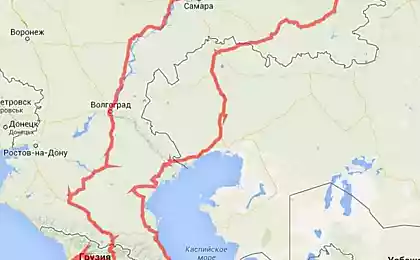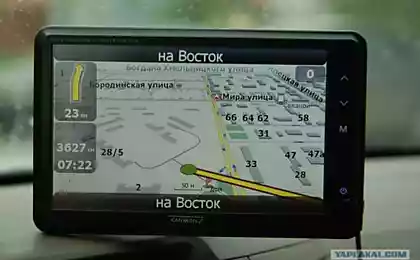483
PlasticRoad: smooth and durable roads from recycled bottles
Every year hundreds of cars get damage due to potholes on roads that appear faster than they are repaired. Russian motorists this problem is known particularly well. But the Dutch company was a great idea as a problem of holes and cracks on the pavement to decide once and for all: the Dutch propose to build roads from recycled plastic bottles!
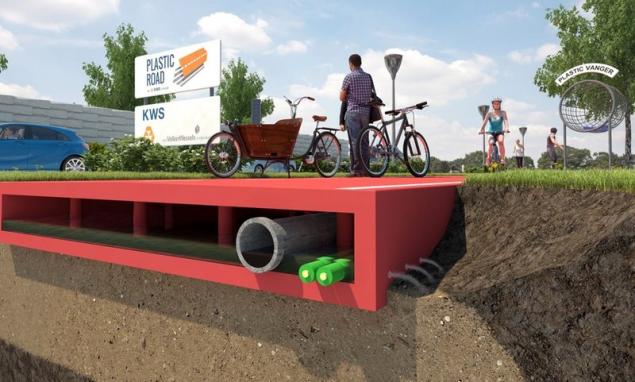
VolkerWessels approached the problem very seriously and comprehensively. The project goal is not only to make the road surface better. This is only part of the big ideas of the company.
Road PlasticRoad will be made so that the inside will be blank spaces where at any time the relevant services will be able to lay a cable or pipe. They don't have to break the asphalt and dig all around, creating many kilometers of traffic jams. However, the authors of the idea look much further, when, in the future cars will be networked, it will be possible to upgrade plastic road.
For example, under the road surface will be very easy to place sensors to capture traffic data. Rain water will flow off the road through empty space, and the plastic can be heated to avoid the formation of ice in the winter. How will this work? Every vehicle traveling on the road creates vibrations that can be converted into electricity.
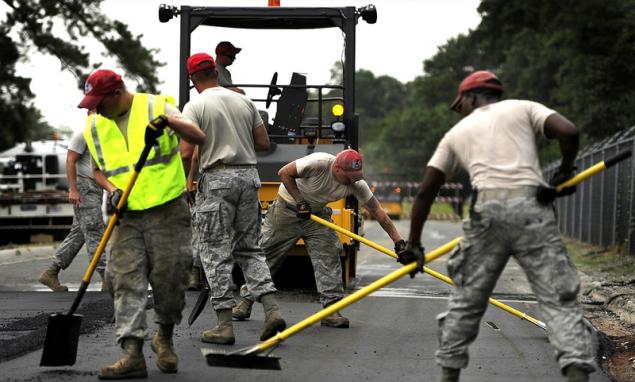
The concept has other advantages. PlasticRoad consists of ready-made modules, which are combined in the way without requiring its gradual stacking layer by layer. This reduces construction time from months to weeks. Of course, for plastic sections of the road also requires a solid Foundation, but specaility VolkerWessels say that it may just be very well tamped sand.
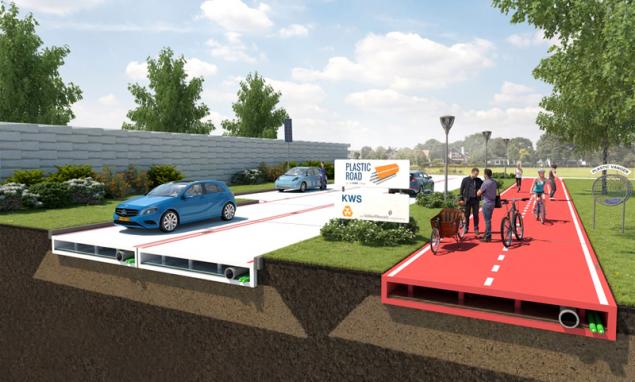
Plastic is a highly resistant material. It practically does not deform under the influence of traffic flow and temperatures. It can withstand temperatures from -40 to +80 degrees Celsius.
In addition, the plastic cover is durable. PlasticRoad potentially can serve three times longer compared to an asphalt surface that requires replacement or repair after 12 years of use. The average service life of plastic roads is about 30 years, so the project can lead to very significant savings.
Of course, to build roads made entirely from recycled materials, it is necessary to process huge amounts of plastic bottles. VolkerWessels offers to collect them in the ocean, where with the help of another Dutch technology (Ocean Cleanup) has fished trash out of the water with huge nets.
When it comes to environmental protection, reduction of CO2 emissions is also important. In the processing of asphalt and releases massive amounts of carbon dioxide. Every year around the world stands out 1.6 million tons of CO2 in road construction. This is approximately 2% of all emissions caused by road traffic.
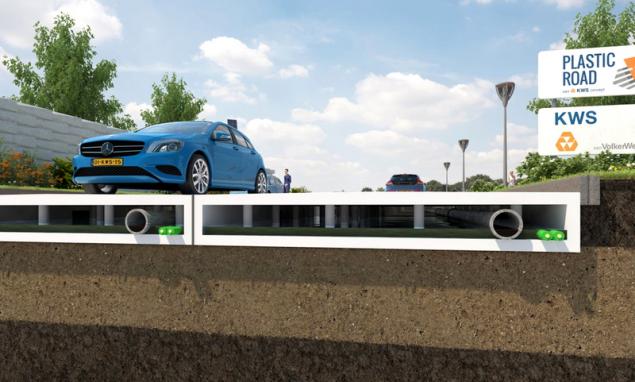
The road is composed entirely of recycled materials, you may receive in the next three years. But first you must build a prototype to check the design of the drainage system and how PlasticRoad cope with the workload in various weather conditions.
The first inspections will be conducted at the test site in Rotterdam. However, the implementation of this idea VolkerWessels require more partners — in particular, companies that are familiar with the process of plastic recycling. published
Image 1, 2 and 3: VolkerWessels / Image 3: Flickr — Timo Saarenketo (CC BY 2.0) / Video: Ocean Cleanup / Image 5: Flickr —sbamueller (CC BY-SA 2.0)P. S. And remember, only by changing their consumption — together we change the world! ©
Join us in Facebook and in Vkontakte, and we're Classmates
Source: iq.intel.ru/plasticroad-dorogi_bez_viboin/

VolkerWessels approached the problem very seriously and comprehensively. The project goal is not only to make the road surface better. This is only part of the big ideas of the company.
Road PlasticRoad will be made so that the inside will be blank spaces where at any time the relevant services will be able to lay a cable or pipe. They don't have to break the asphalt and dig all around, creating many kilometers of traffic jams. However, the authors of the idea look much further, when, in the future cars will be networked, it will be possible to upgrade plastic road.
For example, under the road surface will be very easy to place sensors to capture traffic data. Rain water will flow off the road through empty space, and the plastic can be heated to avoid the formation of ice in the winter. How will this work? Every vehicle traveling on the road creates vibrations that can be converted into electricity.

The concept has other advantages. PlasticRoad consists of ready-made modules, which are combined in the way without requiring its gradual stacking layer by layer. This reduces construction time from months to weeks. Of course, for plastic sections of the road also requires a solid Foundation, but specaility VolkerWessels say that it may just be very well tamped sand.

Plastic is a highly resistant material. It practically does not deform under the influence of traffic flow and temperatures. It can withstand temperatures from -40 to +80 degrees Celsius.
In addition, the plastic cover is durable. PlasticRoad potentially can serve three times longer compared to an asphalt surface that requires replacement or repair after 12 years of use. The average service life of plastic roads is about 30 years, so the project can lead to very significant savings.
Of course, to build roads made entirely from recycled materials, it is necessary to process huge amounts of plastic bottles. VolkerWessels offers to collect them in the ocean, where with the help of another Dutch technology (Ocean Cleanup) has fished trash out of the water with huge nets.
When it comes to environmental protection, reduction of CO2 emissions is also important. In the processing of asphalt and releases massive amounts of carbon dioxide. Every year around the world stands out 1.6 million tons of CO2 in road construction. This is approximately 2% of all emissions caused by road traffic.

The road is composed entirely of recycled materials, you may receive in the next three years. But first you must build a prototype to check the design of the drainage system and how PlasticRoad cope with the workload in various weather conditions.
The first inspections will be conducted at the test site in Rotterdam. However, the implementation of this idea VolkerWessels require more partners — in particular, companies that are familiar with the process of plastic recycling. published
Image 1, 2 and 3: VolkerWessels / Image 3: Flickr — Timo Saarenketo (CC BY 2.0) / Video: Ocean Cleanup / Image 5: Flickr —sbamueller (CC BY-SA 2.0)P. S. And remember, only by changing their consumption — together we change the world! ©
Join us in Facebook and in Vkontakte, and we're Classmates
Source: iq.intel.ru/plasticroad-dorogi_bez_viboin/

